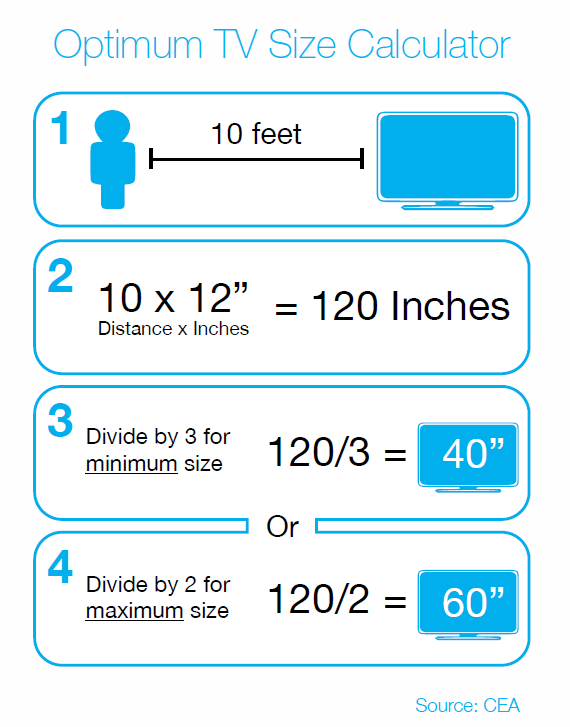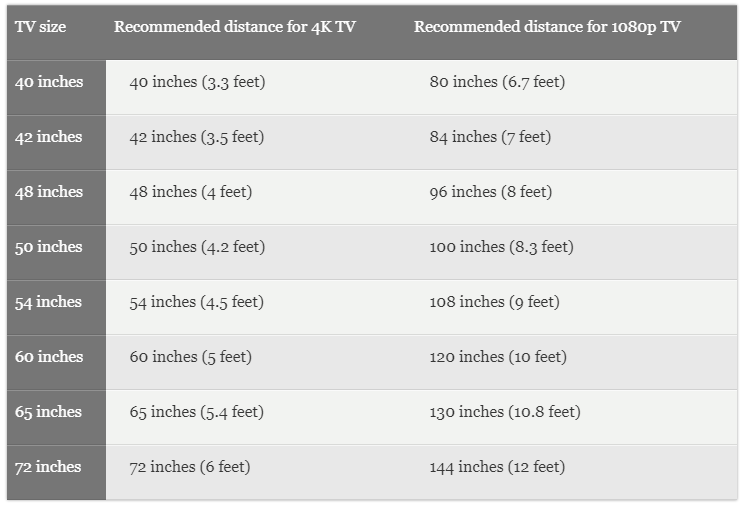Despite the increased popularity of smartphones and other devices, television is still the main source of entertainment for hotel guests. However, when it comes to purchasing new TVs, a lot of hoteliers face the challenge of choosing the right one. For this reason, we, at Hotel TV Company, have devised a few useful tips on how to find the right TV!
How to make the right choice?
More, more and more guests are expecting to receive the same size and quality television or better than what they have at home. That, combined with the demand for bigger and bigger TVs in the past couple of years has created a major challenge for hoteliers when upgrading their hotel TVs. In fact, from median TV Screen Sizes of 33.2 inches in 2010, the average TV screen size has jumped to 40.6 inches in 2016 and to 42.6 inches in 2017.
But how big is too big?
There are several factors that can influence a guest’s viewing experience:
- Viewing distance
- Display resolution
- Room arrangement
- Viewing angle
Firstly, to determine the best size based on the guests’ viewing distance, we should divide the viewing distance (in inches) by 3. That gives us the minimum recommended TV screen size in inches. In other words, if guests are seated 10 feet away from the TV (10 feet = 120 inches), then the recommended screen size is 40 inches. In addition, dividing the viewing distance (in inches) to 2, would give us the maximum screen size for that room.

Furthermore, the larger the TV screen is, the more important display resolution becomes. For a 40 inches or smaller TV, a 720p resolution can be enough, however the difference between 720p and 1080p can be easily noticed with 50-inch screens or larger. While some smaller TV screens are still available in 720p, 1080p resolution displays are preferred amongst customers as they perform better with screens up to 60 inches (Samsung).

In addition, 4K (UHD) TVs with resolution up to 3840×2160 are growing in popularity in the consumer market. They can offer superb, high quality image and truly surprise your hotel guests. However, UHD TVs are a significant investment and are not yet widely used within the hospitality sector. In addition, viewing angles can also influence guests’ experience. Ideally, the TV should be placed parallel to the guest’s eyes, with no more than a 15-degree angle up or down and no more than a 40-degree angle to the left or right. Needless to say, sitting at a sharp angle from the TV can result in poor TV images (Samsung).
Finally, room arrangement and TV placement can have an impact on the guests’ viewing experience. While both wall mounting your hotel TVs and using TV stands can save room space and enhance its design, it is important for hotels to ensure cable clutter free TV placement.
Why you should choose a hospitality over a domestic TV?
Nowadays TV and display manufacturers such as Samsung, LG and Philips produce a new generation TVs – Hospitality TVs – designed for use in a commercial environment and are much more suitable to hospitality businesses as opposed to domestic TVs. The major difference with these spectacular Hospitality Displays is in the exclusive range of features they offer to hoteliers. These hotel mode TVs are much more suited to a hospitality business and are designed to eradicate some of the most common issues with domestic TVs used in a commercial environment.
Hospitality TVs offer a range of features including:
- Volume settings: This special configuration allows the hotelier to set a maximum volume on the in-room TVs. This feature helps prevent guests disturbing others around them by playing the TV too loud.
- Power-On settings: This feature allows hoteliers to configure what happens when the TV turns on. For instance, the TV can be set to always start on a specific channel, or it could start on a different input source, like a HDMI etc.
- Channel settings: This setting offers hotel owners to lock the channels on the TV. This, in turn, eliminates any issues with guests removing channels off the TV while browsing through.
- Security settings: The main use for this feature is to reset the TV and log out of all accounts after the TV has been turned off for a certain amount of time. This will protect your guests’ personal data and give them the confidence to use all TV features
These Hotel Mode TVs are an essential in the Hospitality Industry, they can provide welcome messages to new customers, splash pages showing the hotel logo as they turn the TV on, channel mapping and cloning setting, without any kind of IP-TV solution. What’s more? Smart Hospitality Displays include internal players which replaces the use of set top boxes, keeping costs down for the hotelier.
In addition, when using a domestic TV in a commercial environment, you may come across a few issues that you would like to avoid.
Firstly, any warranty that you are offered with the TVs will be void when it is used in a commercial environment. For most warranties use on commercial premises is expressly forbidden. For example, if the TV is for domestic use, and you have used it in a commercial environment but claim that you have not, this can be seen as committing fraud. On the other hand, many Commercial TV suppliers offer a minimum of 2 years commercial warranty. In this case, you would be using a TV that is much more suited for a hospitality business, offer a range of useful features and comes with a minimum of 2 years warranty. Why wouldn’t you just go with it?
The next step…
TV systems can be an effective sales & marketing tool for any hotel, large or small. While they can be seen as a significant financial investment, they allow hotels to display customisable information directly on the TV and even sell additional products and services.
TV Systems also vary based on the functionalities required by the hotel. Some of the most basic systems allow for customised information pages, welcome page, RSS feeds, Electronic Program Guide (EPG) and advertisement tickers. In comparison, fully interactive TV Systems link seamlessly with the hotel PMS to enable product purchase whilst offering an enticing large screen sales brochure in each hotel room. Interactive TV systems can be used to create an additional revenue stream for hotels


Thomas Corino
In need of hotel TVs that will work best with cable boxes. Ability to turn on to a specific input is also important, as guests hook up games, change input, and next guest can’t figure out.
MdvEnterprise
Hi Thomas,
Thank You for your query, our team will get back to you shortly.